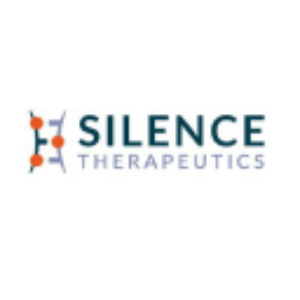Silence Therapeutics Announces Positive Results from Ongoing SANRECO Phase 1 Study of Divesiran in Polycythemia Vera Patients
Divesiran eliminated the need for phlebotomy in all well-controlled patients following infrequent dosing and was well tolerated
Data support advancing divesiran into Phase 2
Company to host conference call today at 8:30am Eastern Time
“With today’s very exciting PV data, Silence is continuing to emerge as a true platform company. Both of our lead proprietary programs are now generating excellent clinical results,” said Craig Tooman, President and CEO at Silence. “Divesiran is poised to be the first siRNA for PV, and we look forward to advancing development with a phase 2 start planned by year-end.”
The 34-week, open-label Phase 1 study is evaluating divesiran (3 mg/kg, 6 mg/kg and 9 mg/kg) administered subcutaneously every 6 weeks for four doses, with a 16-week follow-up period following the date of the last administered dose in up to 24 PV patients. Key inclusion criteria include a PV diagnosis and a history of requiring at least three phlebotomies in the last six months or five in the last year prior to screening. Patients are allowed to be on stable doses of cytoreductive agents. Given the exploratory nature of this Phase 1 study, both well-controlled patients - defined as those with hematocrit (HCT) levels at
The data being presented today are based on a data cut-off date of March 29, 2024, and include analysis of 16 patients over a time range of approximately 4 to 34 weeks of study involvement. Of the 16 patients, 8 patients are considered well-controlled and 8 patients have HCT levels over
To date, divesiran has been observed to be well tolerated with no major safety issues.
None of the 8 patients entering the trial with well-controlled HCT levels required a phlebotomy during the divesiran treatment period, which was defined in the study as the period up to 6 weeks after the last dose. All patients in the well-controlled group maintained adequate control of HCT levels as per treatment guidelines. Of the 8 patients entering the trial with HCT levels above
In all dose groups, there was a sustained reduction in hematocrit during the treatment period and favorable effects on indices of iron metabolism. Hepcidin levels increased and were sustained within physiological levels in all dose groups, demonstrating target engagement.
“Divesiran treatment in PV patients results in sustained increases in hepcidin, reflecting crucial target engagement,” said Professor Tomas Ganz, MD, PhD, Distinguished Professor of Medicine and Pathology Department of Medicine, UCLA. “Divesiran exerts a beneficial effect on hematological parameters and significantly reduces phlebotomies. These exciting data suggest that divesiran has the potential to produce clinically meaningful outcomes in this patient population.”
“Based on these early results, divesiran appears to meaningfully impact key hematological parameters in this rare myeloproliferative neoplasm,” said Steven Romano, MD, Silence’s Head of Research and Development. “We are particularly encouraged by the safety profile and the potential for divesiran to be administered infrequently to PV patients requiring pharmacological intervention to manage their disease.”
As of today, Silence has enrolled 21 patients in the SANRECO study and the Company anticipates closing enrollment at the end of this month. Full results are expected to be presented at a scientific meeting later this year. Divesiran has received FDA Fast Track designation and FDA Orphan Drug Designation for PV.
Conference Call and Webcast Details
Management will host a conference call and webcast today, June 27, 2024, at 8:30 am ET to discuss results from the ongoing SANRECO phase 1 study. To access the call, please register online at https://register.vevent.com/register/BI33ea9b075fa841ea9597cc915562e79c. Participants are requested to register at a minimum of 15 minutes before the start of the call. A replay of the call will be available two hours after the call and archived on the same web page for six months.
A live webcast will also be available on the Investors section of the Company’s website at www.silence-therapeutics.com. An archived webcast will be available on the Company’s website approximately two hours after the event.
About PV
PV is a rare, myeloproliferative neoplasm – a type of blood cancer - characterized by the excessive production of red blood cells, often resulting in elevated hematocrit levels. Elevated hematocrit above 45-percent is associated with a four-times higher rate of death from cardiovascular or thrombotic events. PV is associated with a range of burdensome symptoms including fatigue, cognitive disturbance and pruritis and additionally, longer term can transform to myelofibrosis and Acute Myeloid Leukemia. The aim of treatment is to maintain hematocrit less than
About Divesiran
Divesiran is Silence’s wholly owned siRNA developed from its proprietary mRNAi GOLD™ platform that “silences” TMPRSS6 expressed almost exclusively in the liver. TMPRSS6 is a negative regulator of hepcidin, the body's master regulator of iron metabolism including its absorption, distribution, and storage. By silencing TMPRSS6 in PV patients, divesiran aims to increase hepcidin production and release by liver hepatocytes, leading to the restriction of iron to the bone marrow and, thus, reducing the excessive production of red blood cells, a process dependent on availability of iron.
About Silence Therapeutics
Silence Therapeutics is developing a new generation of medicines by harnessing the body's natural mechanism of RNA interference, or RNAi, to inhibit the expression of specific target genes thought to play a role in the pathology of diseases with significant unmet need. Silence's proprietary mRNAi GOLD™ platform can be used to create siRNAs (short interfering RNAs) that precisely target and silence disease-associated genes in the liver, which represents a substantial opportunity. Silence's wholly owned product candidates include zerlasiran designed to address the high and prevalent unmet medical need in reducing cardiovascular risk in people born with high levels of lipoprotein(a) and divesiran designed to address hematological diseases, including polycythemia vera. Silence also maintains ongoing research and development collaborations with AstraZeneca and Hansoh Pharma, among others. For more information, please visit https://www.silence-therapeutics.com/.
Forward-Looking Statements
This press release contains “forward-looking statements” within the meaning of the Private Securities Litigation Reform Act of 1995. All statements in this press release other than statements of historical facts are “forward-looking statements. These statements may be identified by words such as “aims,” “anticipates,” “believes,” “could,” “estimates,” “expects,” “forecasts,” “goal,” “intends,” “may,” “plans,” “possible,” “potential,” “seeks,” “will” and variations of these words or similar expressions that are intended to identify forward-looking statements, although not all forward-looking statements contain these words. Forward-looking statements in this press release include, but are not limited to, statements regarding: the Company’s clinical development activities and timelines for divesiran including the expected timing for reporting further data from the SANRECO trial; the timing and future occurrence of other clinical and clinical activities including proposed clinical trial enrollment and the Company’s plans and timing to advance divesiran into Phase 2; expected clinical benefits of divesiran and the potential to produce clinically meaningful outcomes in PV patients; and the Company’s plans to submit additional data from the SANRECO trial for publication at a future conference. These forward-looking statements are based on the Company’s expectations and assumptions as of the date of this press release. Each of these forward-looking statements involves risks and uncertainties that could cause the Company’s clinical development programs, future results or performance to differ materially from those expressed or implied by the forward-looking statements. Many factors may cause differences between current expectations and actual results, including: preliminary or topline results are based on a preliminary analysis of key efficacy and safety data; the potential that success in preclinical testing and earlier clinical trials does not ensure that later clinical trials will generate the same results or otherwise provide adequate data to demonstrate the efficacy and safety of a product candidate; the impacts of macroeconomic conditions, including the conflict in
View source version on businesswire.com: https://www.businesswire.com/news/home/20240627515407/en/
Silence Therapeutics plc
Gem Hopkins, VP, IR and Corporate Communications
Tel: +1 (646) 637-3208
ir@silence-therapeutics.com
Media Relations
MKC Strategies
Mary
Tel: +1 (516) 606-6545
mconway@mkcstrategies.com
Source: Silence Therapeutics plc







